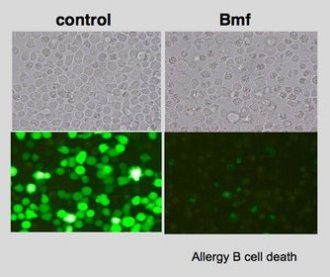Mar. 9, 2007 Research Highlight Biology
Death to allergy-inducing cells
How attenuated tuberculosis infection stems allergy
 Figure 1: A microscopic image showing that allergy-inducing B cells (green cells, left) undergo cell death when the death promoting factor Bmf is active (right).
Figure 1: A microscopic image showing that allergy-inducing B cells (green cells, left) undergo cell death when the death promoting factor Bmf is active (right).
Worldwide—but particularly in industrialized countries—incidence of allergy is on the rise. Although the reasons for this are not clear, some scientists have speculated that excessive use of antibiotics and heightened cleanliness prevent beneficial infections early in life that would normally drive immune system development in a way that lessens the possibility of allergy in adulthood.
A collaboration of scientists led by Masaru Taniguchi of the RIKEN Research Center for Allergy and Immunology, Yokohama, now demonstrates1 that vaccination with Mycobacterium bovis bacillus Calmette Guerin (BCG), the current vaccine against human tuberculosis, stimulates the immune system to dampen allergic responses.
Working with mice as a well-characterized model of induced allergy, the team characterized the types of immune cells that respond to BCG vaccination. “BCG, [which is] ethically approved in Japan, was used to mimic bacterial infection in allergy patients or healthy volunteers,” says Taniguchi.
The team found that NKT cells—a special subset of immune cells found especially in the liver—were responsible for the anti-allergy effect. Using genetically modified mice that lack all NKT cells, they demonstrated that NKT cells are required to suppress allergy after BCG vaccination.
They also found that interleukin 21 (IL-21) expressed by the NKT cells was important, and that another cytokine, IL-12 made by dendritic cells that respond directly to BCG, was required to stimulate the NKT cells to produce IL-21.
Exactly how BCG stimulates dendritic cells is not clear. “Because BCG is a live vaccine, many candidate BCG proteins can stimulate dendritic cells,” says Taniguchi. “We are currently collaborating with biochemists to purify BCG-derived products and to identify essential molecules.”
The key to control of allergy after BCG vaccination is the IL-21 produced by NKT cells, which affects allergy-producing B cells in a way that causes them to die. The team found that IL-21 induces activation of the death-promoting factor Bmf in B cells, which blocks the death-preventing factor Bcl-2 from keeping the cells alive (Fig. 1).
The importance of the study by Taniguchi and colleagues lies in the characterization of mechanism by which BCG decreases allergy, which may have therapeutic implications. It also shows that infection (or vaccination) can reduce allergy.
“It is easy to imagine that the IL-21 pathway in B cells provides a target for developing anti-allergy drugs,” notes Taniguchi. “If we can successfully identify a low molecular weight compound or a small molecule that stimulates the pathway, we can develop a drug for a treatment of allergy.”
References
- 1. Harada, M., Magara-Koyanagi, K., Watarai, H., Nagata, Y., Ishii, Y., Kojo, S., Horiguchi, S., Okamoto, Y., Nakayama, T., Suzuki, N., Wen-Chen Yeh, Akira, S., Kitamura, H., Ohara, O., Seino, K. & Taniguchi, M. IL-21–induced Bε cell apoptosis mediated by natural killer T cells suppresses IgE responses. The Journal of Experimental Medicine 203, 2929–2937 (2006). doi: 10.1084/jem.20062206
